 Petzlover
Petzlover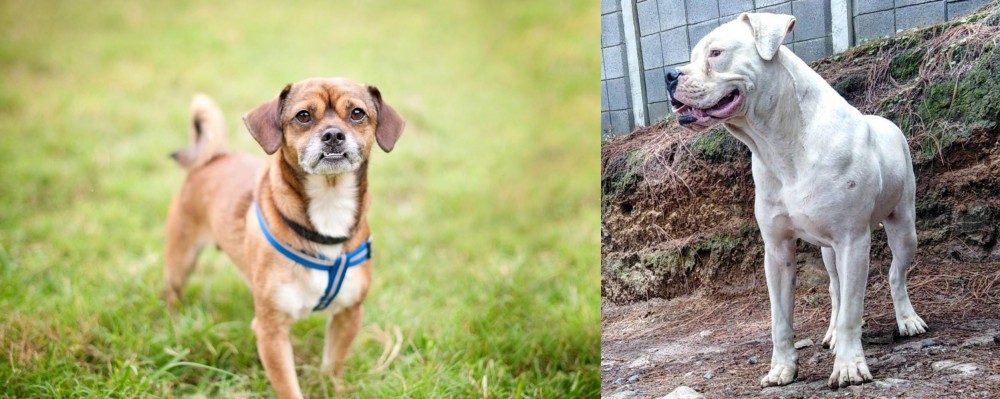 Chug is originated from United States but Dogo Guatemalteco is originated from Guatemala. Chug may grow 35 cm / 13 inches shorter than Dogo Guatemalteco. Chug may weigh 36 kg / 79 pounds lesser than Dogo Guatemalteco. Both Chug and Dogo Guatemalteco has almost same life span. Both Chug and Dogo Guatemalteco has same litter size. Both Chug and Dogo Guatemalteco requires Moderate Maintenance.
Chug is originated from United States but Dogo Guatemalteco is originated from Guatemala. Chug may grow 35 cm / 13 inches shorter than Dogo Guatemalteco. Chug may weigh 36 kg / 79 pounds lesser than Dogo Guatemalteco. Both Chug and Dogo Guatemalteco has almost same life span. Both Chug and Dogo Guatemalteco has same litter size. Both Chug and Dogo Guatemalteco requires Moderate Maintenance.
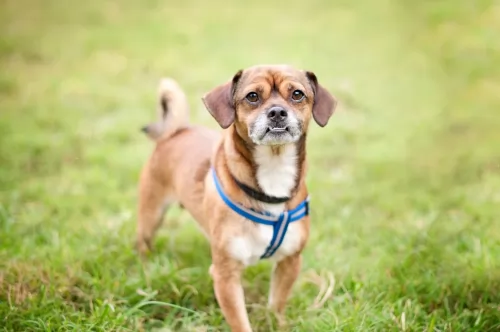 The Chug is a crossbreed with the Pug and the Chihuahua. It is a hybrid not a purebred. Over the past ten to fifteen years people have been developing the Chug, mostly in the United States. People were looking for a lapdog with the characteristics of both the Chihuahua and the Pug. The hybrid dog has characteristics of both breeds, both physical and behavioral. Of course, the Chug is not recognized by the AKC, but it is recognized by hybrid and designer dog clubs such as The American Canine Hybrid Club, Designer Breed Kennel and the International Designer Canine Registry.
The Chug is a crossbreed with the Pug and the Chihuahua. It is a hybrid not a purebred. Over the past ten to fifteen years people have been developing the Chug, mostly in the United States. People were looking for a lapdog with the characteristics of both the Chihuahua and the Pug. The hybrid dog has characteristics of both breeds, both physical and behavioral. Of course, the Chug is not recognized by the AKC, but it is recognized by hybrid and designer dog clubs such as The American Canine Hybrid Club, Designer Breed Kennel and the International Designer Canine Registry.
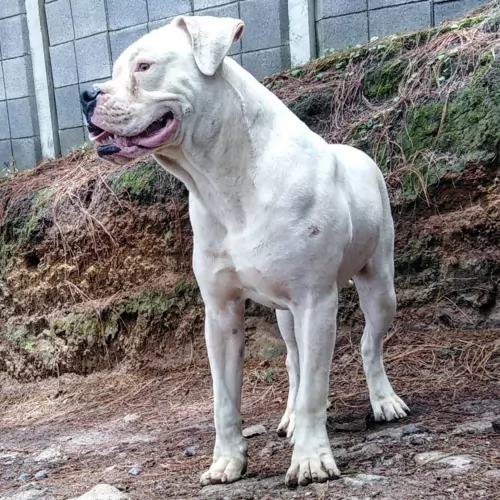 Known as the Guatemalteco Bull Terrier or Guatemalan Molosser, the Dogo Guatemalteco is also known as the Bull Terrier Guatemalteco, Guatemalan Bull Terrier, and Guatemalan Molosser.
Known as the Guatemalteco Bull Terrier or Guatemalan Molosser, the Dogo Guatemalteco is also known as the Bull Terrier Guatemalteco, Guatemalan Bull Terrier, and Guatemalan Molosser.
This big Molosser-type dog originates in Guatemala. In the 20th century, it was known as the Bullterrier Guatemalteco, but at the end of the century, it was changed to Dogo Guatemalteco.
Today, while the dog is kept as a companion dog, most are working guard dogs. The Dogo Guatemalteco isn’t recognized by any major international kennel clubs. However, the Kennel Club of Guatemala has given full recognition to this dog and it was in 1981 that the Guatemalan government named the dog as their national dog breed.
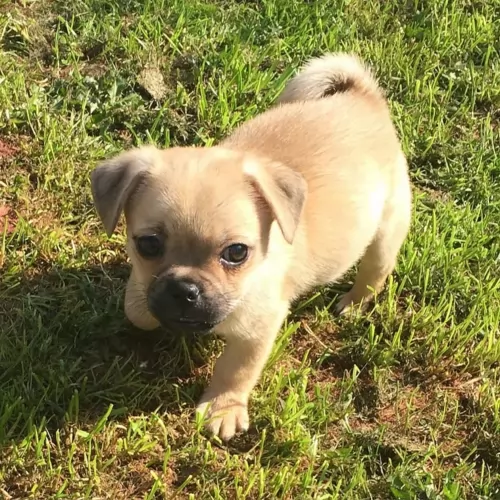 The Chug can vary greatly in looks and build from one dog to another. For the most part however, Chugs are small compact dogs, sturdy and muscular. They have a very expressive and lovable face with folding ears, almond shape eyes and short muzzles. Their faces are similar in looks to that of a miniature boxer. .
The Chug can vary greatly in looks and build from one dog to another. For the most part however, Chugs are small compact dogs, sturdy and muscular. They have a very expressive and lovable face with folding ears, almond shape eyes and short muzzles. Their faces are similar in looks to that of a miniature boxer. .
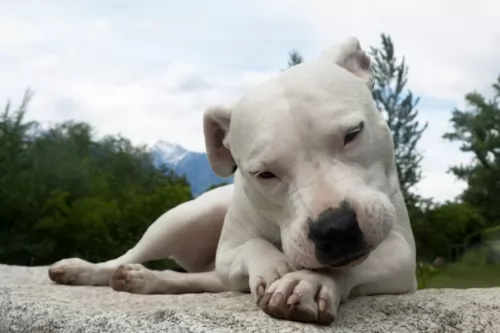 The Guatemalteco is a medium to large dog standing at 54 – 60cm and weighing between 40-45kg. He has a short, smooth coat and is essentially white with some black markings on the head.
The Guatemalteco is a medium to large dog standing at 54 – 60cm and weighing between 40-45kg. He has a short, smooth coat and is essentially white with some black markings on the head.
This breed was created from a crossing between a bull terrier, boxer and dalmatian. Some of the dogs are thickly built, while others are more leaner and athletic looking.
The ears of the dog vary quite a bit because while sometimes the ears fold down closely to the head, others are semi-pricked. There are some dog owners who have their dogs ears cropped into fully erect triangular shapes. The eye are small and usually dark brown.
The Dogo Guatemalteco is a fearless, evenly tempered dog. He was bred as a guard dog and he wants to protect his human family, forming a deep bond with them. It makes them difficult to re-home because of this.
It is imperative to have this dog trained and socialized because it might believe its the leader of the pack in your home. He is quite capable of getting along well with children and pets in the home. Because of his dominant nature, he isn’t suited as a pet for the first-time dog owner. He also doesn’t warm easily to strangers.
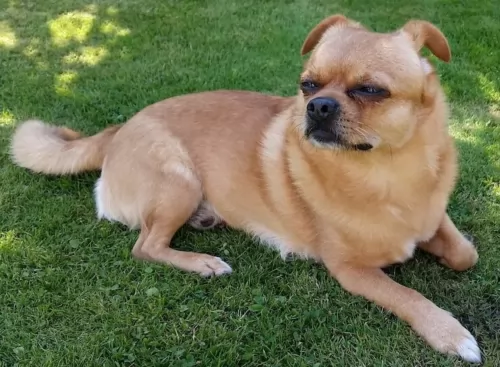 Because they are a hybrid, chugs can have a very wide range of different characteristics depending upon whether they have more from the Pug or more from the Chihuahua. But either way they are very lovable little dogs with big personalities. Regardless of whether your dog favors the clown Pug or the stately Chihuahua, your puppy will be a lovable ball of fur. He will be affectionate, friendly and aggressive to bigger dogs.
Because they are a hybrid, chugs can have a very wide range of different characteristics depending upon whether they have more from the Pug or more from the Chihuahua. But either way they are very lovable little dogs with big personalities. Regardless of whether your dog favors the clown Pug or the stately Chihuahua, your puppy will be a lovable ball of fur. He will be affectionate, friendly and aggressive to bigger dogs.
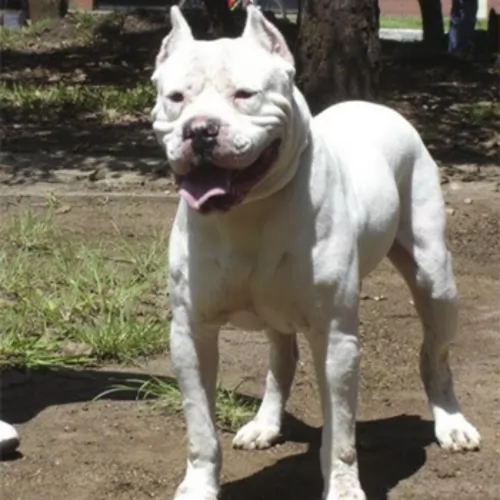 Your Dogo Guatemalteco is an intelligent dog breed, and because he is strong-willed and stubborn he might give you a hard time during training. It is possible though and it is important as the training will turn him into an obedient, relaxed dog, able to get on with all his family members, including pets.
Your Dogo Guatemalteco is an intelligent dog breed, and because he is strong-willed and stubborn he might give you a hard time during training. It is possible though and it is important as the training will turn him into an obedient, relaxed dog, able to get on with all his family members, including pets.
He is an energetic dog and will require walks and other forms of exercise each day.
This is certainly not the kind of dog that you buy to protect your property and provide little else for him except food and water. Frustration on the dog’s part can lead to destructive behavior and aggression.
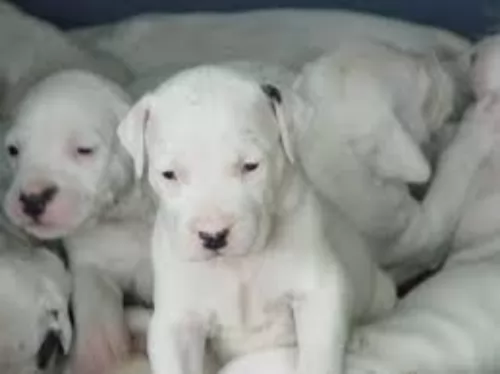 This dog can be susceptible to skin allergies. The skin is sensitive and prone to rashes.
This dog can be susceptible to skin allergies. The skin is sensitive and prone to rashes.
Another health concern with this dog because of his white coat, is congenital deafness. The deafness could be in one- or both ears.
The dog could also experience lameness, of which the most common problem is hip dysplasia. Because skeletal problems occur in this breed, it is advisable for owners to have their pet tested by the Orthopedic Foundation for Animals.
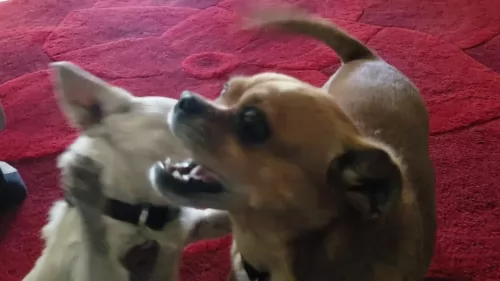 Pugs have great appetites and love to eat and Chihuahuas wont turn down a meal so be careful not to overfeed your Chug. It is important to feed a small breed formula whether you use dry or wet food.
Pugs have great appetites and love to eat and Chihuahuas wont turn down a meal so be careful not to overfeed your Chug. It is important to feed a small breed formula whether you use dry or wet food.
Some additional issues that Chugs deal with in respect to health include:
Both elbow and knee inflammations can lead to arthritis and lameness
Chugs can have runny eyes or cherry eye. If they have cherry eye you will want to treat it immediately or there could be secondary issues with inflammation and infection.
Chugs may be little, but they still need a moderate amount of exercise every day. A regular walk will do or indoor or outdoor playtime every day. They like obedience, rally and some can do small dog agility, but they would have to be on the larger size for Chugs. Chugs also make great therapy dogs.
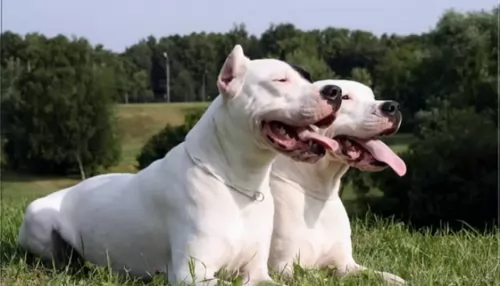 The coat of the dog is short and harsh and it sheds throughout the year. While he is still looked upon as a low maintenance dog, regular brushing will be required twice a week.
The coat of the dog is short and harsh and it sheds throughout the year. While he is still looked upon as a low maintenance dog, regular brushing will be required twice a week.
Because he is a dog breed that is susceptible to skin allergies, bathing isn't necessary as it removes the dog’s natural oils.
Other areas of grooming for this dog are brushing his teeth twice a week, trimming his nails and checking his ears.
Always choose a high quality dog food for your Dogo Guatemalteco and look at the feeding recommendations on the packaging.
When you feed your pet kibble, you can also mix in some cooked brown rice, vegetable and chicken for variety and contentment.
Raw meat is also advised from time to time. Don’t just go on and on through the years feeding your dog the same amount of food, as there are factors to take into account when deciding on food quantity. The age of your dog, it’s stage of life and its activity levels will mean regulating your pet’s food to match his needs.